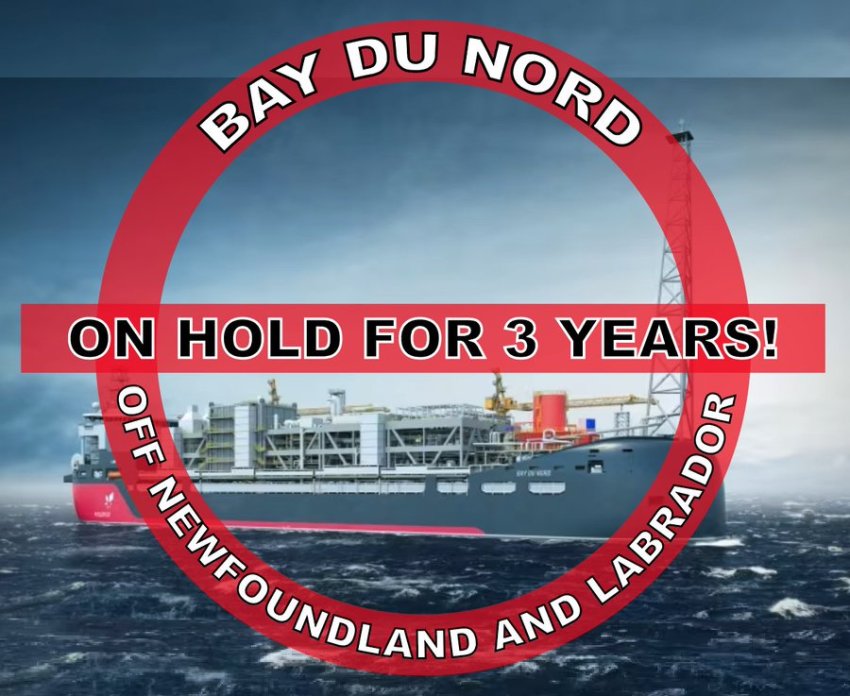
Canadian politics was rocked on May 31, with news that Norwegian oil giant Equinor’s Bay du Nord project, the first deep water oil project in Canada, has been stopped for a period of three years. The news came in the form of a press release in the middle of the Energy NL Conference and Exhibition in St John’s, Newfoundland, the province where the project would be sited.
The company claims the reason for the shelving of the mega-project comes “in the face of challenging market conditions”. Yet Equinor has been fighting efforts by Indigenous communities and environmentalists to stop the project completely.
As I reported recently, environmental legal non-profit Ecojustice filed suit in federal court on behalf of Mi'gmawe'l Tplu'taqnn, which represents the Mi’kmaq communities, and environmental groups Equiterre and the Sierra Club Canada Foundation in March. They argued that the project was “unreasonable and unconstitutional” because the environmental assessment did not account for total greenhouse gas emissions from consumption and use of the oil produced by the project. They also argued that the assessment violated informed consent requirements with Indigenous communities by failing properly to consult the Mi’kmaq about the project, and ignored concerns from Mi'gmawe'l Tplu'taqnn about oil spills, leaks, and habitat destruction.
Connor Curtis, head of communications with the Sierra Club Canada Foundation, responded to the unexpected news by saying: “Because we’re aiming to meet our climate target, really in the long-term that means that a lot of that oil would not be needed. So developing long-term reserves of fossil fuels like the oil and gas from projects off of Newfoundland and Labrador, including Bay du Nord, really doesn’t make much sense.”
He went on to use this development as an opportunity to reset thinking about fossil fuel project dependence of governments in Canada. The federal government, with its multi-billion-dollar boondoggle purchase of the Trans Mountain pipeline across British Columbia, and the provincial governments in Alberta and Newfoundland and Labrador remain captured by a framework that equates economic viability with extractives industries. All the while, it peddles fantasies of sustainability and “greener” energy development.
As Curtis put it: “[W]e had questions about the viability of these projects for quite a long time. I’m not really surprised by it, but to a certain extent I hope that this does send a message to the provincial government and to the federal government. They need to start rapidly decarbonising NL’s economy. If they're betting the future of the economy on an expansion in oil and gas and doubling production of oil and gas, that's just not going to happen. If that’s what they're betting on, that's really misleading a lot of people.”
Some observers believe that the announcement is a ploy by the company to squeeze more money out of the provincial government and/or get them to accept more of the project construction being done outside of Newfoundland and Labrador. Building major portions of the project outside of Canada would allow the company to target countries where labor would be cheaper. Successive provincial governments of Newfoundland and Labrador have histories of bending over backwards to give subsidies to oil and gas developments.
Darin King of Trades NL suggested: “We talked to Premier Furey and Minister Parsons regularly and both of them were generally supportive of making sure this FPSO wasn't going to be developed entirely out-of-province. So, they both took a hard line and it may have something to do with that.”
If Curtis was not surprised others, among them key government figures, were. Newfoundland and Labrador Premier Andrew Furey said the news came as a surprise to him. Industry insider Rob Strong suggests the shelving is far more serious for the project than some want to believe: “If there’s no Bay du Nord, what is there?”
We can only hope that the answer remains no more Bay du Nord and prompts a rethinking of political economy along lines that prioritise the health and safety of ecosystems, Indigenous and working-class communities and pursues a path that does not turn public funding over to destructive extractive industry capital.